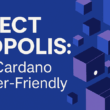In a world plagued by ever-widening social and economic divisions, blockchain technology has emerged as a potential gamechanger, presenting new opportunities to reimagine systems and reduce inequities.
At the forefront of this technological revolution is Cardano – an open-source, decentralized public blockchain and cryptocurrency project. With its novel proof-of-stake consensus mechanism, robust research-based approach, and focus on positive global impact, Cardano aims to be the driving force for transformative change.
The Need for Equality in a Divided World
Before analyzing Cardano’s potential, it is important to understand the context of growing inequality and division that plagues much of the modern world. On multiple indices, disparities in income, wealth, opportunity, education, healthcare, and living standards within and between countries have expanded over recent decades.
Economic inequality is a significant concern, with global wealth concentration reaching record highs. The richest 1% own close to 50% of the world’s wealth while the bottom 50% collectively own less than 1% of global assets. In the United States, income inequality is the highest since the 1920s, with the top 10% earning 9 times more than the bottom 90%.
Such economic disparities intersect with race, gender, disability, and other markers of disadvantage. Discrimination and lack of access to capital and networks hampers the upward mobility of marginalized groups. Sadly, being born into certain demographics often profoundly impacts life outcomes and potential.
Beyond the economic realm, grave inequalities exist in social, political, and civil rights. Billions lack access to healthcare, quality education, housing, clean water, electricity, and sanitation. Political and civic marginalization is widespread in many societies where a few wield power and influence at the expense of the majority.
The COVID-19 pandemic laid bare and exacerbated many inequalities globally. As with previous crises, the impacts were disproportionately borne by disadvantaged communities highlighting the precariousness of their position in social systems.
Unfortunately, existing financial and governance structures have proved inadequate in tackling these systemic inequities. Traditional institutions like banks and governments – plagued by bureaucracy, corruption, and inertia – have often perpetuated exclusion. The centralization of power, wealth, and decision-making in the hands of the few continues to divide societies.
There is an urgent need for new solutions – technical, economic, and political – that can design more equitable and inclusive systems. As we will explore, blockchain technology and Cardano offer a radical new approach with transformative potential.
The Genesis of Cardano – A Vision to Reshape Society
Cardano was founded in 2015 by Charles Hoskinson, one of the original co-founders of Ethereum, and Jeremy Wood. Disillusioned with the direction Ethereum was taking, Hoskinson envisaged a new blockchain project that could combine the power of cryptocurrency with a social conscience.
Hoskinson’s vision was to build a blockchain that could provide economic identity and opportunity to the billions worldwide excluded from traditional systems. With pragmatic ideals and high social purpose, Cardano set out to use technology to reshape systems and reduce inequality.
The name ‘Cardano’ pays homage to Gerolamo Cardano, a 16th century polymath whose work on probability laid foundations for modern risk and uncertainty analysis. This ties in with Cardano’s evidence-driven approach and mathematical foundations.
Right from inception, Cardano was conceived with core goals of:
Providing economic identity and opportunity to the economically disadvantaged
Using blockchain technology to reduce corruption and opaqueness in aid and governance
Building decentralized infrastructure for social innovation
Cardano aims to be the blockchain for changemakers, reformers, and visionaries seeking to build fairer systems serving all people. Its open-source, decentralized approach seeks to put power back into the hands of individuals rather than vested interests.
Let’s now look at the specific ways Cardano seeks to engineer greater equality and social justice.
Cardano’s Innovations – How It Stands Apart
Cardano brings together a set of cutting-edge innovations that set it apart from other blockchain projects with respect to its equality and social impact goals. These include:
1. A Robust Academic Foundation:
Unlike many cryptocurrencies that sprang up overnight, Cardano has rigorous academic origins. A large team of leading cryptographers, programmers, scientists, and researchers collaborate with a long-term roadmap for development.
Cardano published its initial whitepaper in 2016 but rather than immediately launch, spent several years doing intensive research to build the most secure, scalable, and useful blockchain possible. No other project invests so heavily in peer-reviewed scientific foundations to inform development.
2. The Ouroboros Consensus Mechanism:
Cardano pioneered Ouroboros, a groundbreaking proof-of-stake consensus protocol. Unlike resource-intensive proof-of-work algorithms, Ouroboros is extremely energy-efficient while still maintaining security and decentralization.
Ouroboros improves on previous proof-of-stake systems by having probabilistic slot leader election. This allows the likelihood of a node being elected leader to be proportional to the amount of ADA tokens held by the node. It is thus a fairer system aligned with Cardano’s ethos of empowering stakeholders.
The Ouroboros algorithm underwent meticulous design by a team of leading academics and has been formally verified using models and proofs. Such rigorous security foundations are unique among blockchains.
3. Multi-Layer Architecture:
Cardano has a modular multi-layered architecture that clearly separates the different functions of the blockchain system for greater flexibility and maintenance. The Cardano Settlement Layer (CSL) acts as the ledger and accounting layer while the Cardano Control Layer (CCL) hosts smart contracts and decentralized applications.
This elegant separation enables easy upgrades, modifications, and scaling as demand grows. It also allows the network to evolve smoothly to meet changing needs while preserving continuity of service.
4. Built-in Governance:
Right from genesis, Cardano was designed to have a sophisticated governance system that supports transparency, engagement, and participation of community stakeholders.
This on-chain governance model avoids centralized control by any group. All ADA holders can participate in voting on network changes and funding decisions. The treasury system also enables the community to propose and fund projects that align with Cardano’s mission.
Such native governance mechanics ensure Cardano evolves democratically in line with the community’s shared vision and ideals. No other blockchain to date integrates governance so seamlessly into its protocol.
5. Sustainable Technology:
As a proof-of-stake blockchain, Cardano uses only a tiny fraction of the energy consumed by proof-of-work cryptocurrencies like Bitcoin. This ensures the network can scale massively without negatively impacting the environment.
Cardano is positioning itself to be the most ecologically sustainable blockchain serving mass audiences in the developing world. Its lean energy footprint aligns with its goal to serve countries with vulnerable environments and natural resources.
6. Superior Smart Contract Capabilities:
Initially, Cardano lacked smart contract functionality which was added in 2021 via the Alonzo hard fork. Cardano now supports Plutus – a purpose-built smart contract language offering major improvements in flexibility and security compared to existing systems like Ethereum.
Plutus smart contracts run on the Cardano Virtual Machine (CVM) which allows formal verification of contract code. This prevents losses and hacks, enabling large-scale decentralized finance with assurance.
Cardano’s multi-currency ledger also enables stablecoins and central bank digital currencies to run natively on its network. This will facilitate far smoother mainstream crypto adoption.
7. Commitment to Standards:
Cardano understands the need for collaboration and standardization for any technology to achieve global ubiquity. It is thus deeply committed to adopting existing standards when possible and working with bodies like the Unicode Consortium to extend standards for emerging use cases.
This adherence to accepted best practices creates seamless interoperability and allows for integration with legacy systems. Cardano can interface with existing public and corporate databases cost-effectively through standard interfaces.
8. Real-World Applicability:
Unlike theoretical projects that get bogged down in technical minutiae, Cardano is obsessively focused on developing real-world applications delivering social impact. The commitment to applied blockchain use cases fosters wide adoption and community growth.
Cardano is concurrently building identity solutions, fintech applications, supply chain trackers, digital governance infrastructure, content attribution systems, and more. It aims to become the backbone for equitable growth in developing countries.
These cutting-edge technological developments enable Cardano to build platforms and solutions delivering on its vision of greater economic and social justice globally. Next, let’s explore specific areas where Cardano will foster equality and reduce inequality.
Cardano foridentity: Promoting Financial and Social Inclusion
Lack of recognized identity is one of the biggest barriers preventing universal economic and social participation. An estimated 1.1 billion people globally have no officially recognized identity.
Without basic ID, individuals remain locked out of financial services, voting rights, social protections, legal rights, and educational or employment opportunities. Unfortunately, undocumented and marginalized communities often stay trapped in a cycle of poverty and exploitation.
Cardano is developing digital identity architectures that give users unprecedented control over their personal data and credentials. These self-sovereign identities will allow selective disclosure of verified attributes to third parties, with users retaining ownership of their information. Identities on Cardano will interface with existing systems yet remain portable across borders. Users can also generate pseudonymous public IDs unlinkable to their real-world selves, adding a layer of privacy.
Cryptographic signatures and recording on an immutable ledger offers unparalleled security compared to centralized databases prone to leaks and hacking. Such decentralized digital identities promise to grant the undocumented, refugees, and other marginalized groups an interoperable economic identity. It could unlock access to services and opportunities otherwise denied to them.
With self-sovereign identity, individuals will finally be empowered over institutions and corporations that have long monopolized control over our personal data.Such robust digital identities can provide billions with economic agency and mobility. Unbanked individuals in countries like Ethiopia and Mongolia could open accounts, apply for credit, access social transfers, get insurance simply by presenting their blockchain IDs.
For refugees and stateless peoples, self-sovereign identity gives the assurance of continuity and recognition no matter where they reside. Digital identities are truly empowering in their inclusiveness.Cardano is partnering with organizations like World Mobile and DishNET to provide digital IDs to unconnected populations in Africa and Asia. Such collaborations to solve real needs display the pragmatic idealism underpinning Cardano.
Cardano for Finance: Banking the Unbanked
Lack of access to basic financial services affects over 1.7 billion adults globally, hindering socio-economic progress. The unbanked struggle with cash-only transactions, unsafe remittances, lack of savings and credit facilities, and lack of insurance against emergencies.Cardano aims to connect the unbanked to the global financial system by leveraging blockchain-powered finance.
Some ways Cardano will promote financial inclusion are:Leveraging decentralized digital identities, Cardano seeks to connect the unbanked to a new global financial system. Identities on the blockchain would enable remote and instant account opening for migrants and marginalized populations often excluded by traditional banks. Cardano’s architecture allows fast, inexpensive cross-border transactions facilitating remittances.
Smart contracts can empower lending platforms to evaluate creditworthiness based on blockchain transaction histories rather than fixed credentials. Cardano also democratizes investing by enabling fractionalized ownership models.
The commitment to interoperability and standards means Cardano can interface with existing banking infrastructure to ease legacy finance into blockchain-based financial rails. Taken together, Cardano portends a future where geographical borders and lack of credentials will no longer inhibit an individual’s ability to participate in the global financial system.
Cardano is already collaborating with fintechs across Africa and Southeast Asia to enable mobile-based blockchain banking and payments for the underbanked. Its partnerships with Techno Brain and World Mobile in Africa highlight how Cardano solutions can rapidly accelerate financial inclusion in developing countries with largely young tech-savvy populations. The future potential for decentralized finance on Cardano is truly vast.
Cardano for Governance: Transparency, Accountability, and Participation
Unaccountable governance and corruption remain stubborn barriers to equality worldwide. Lack of transparency and representation in civic systems enables exploitation of the disempowered by vested interests.
Cardano provides a radically different model of decentralized governance that promotes accountability, community control, and grassroots participation. Some ways Cardano can engineer better governance are:
Cardano offers a new model of accountable and transparent governance. Tamper-proof voting via decentralized IDs, open government databases, anonymous whistleblowing, and censorship-resistant information storage enable greater public oversight over authorities. Cardano resists information suppression and makes speaking truth to power possible.
Through decentralized autonomous organizations, Cardano also empowers coordinated grassroots participation in civic matters. For countries lacking accountability, Cardano provides the tools to enhance transparency, deter corruption, boost free speech, and shift decision-making closer to communities.
These governance solutions will profoundly impact developing countries lacking transparency or representation. For instance, the EU is partnering with Cardano to boost Rwanda’s coffee supply chain traceability and fair pricing model.
Cardano stands at the frontier of an emerging decentralized digital economy that holds promise to reorder many flawed legacy systems perpetuating inequality. With its radical reimagining of identity, finance, governance, sustainability, supply chains, and more, Cardano aims to be an engine for equitable access and opportunity.
The road ahead has many challenges to overcome, but by combining idealism with pragmatism, Cardano seeks to nurture decentralized ecosystems serving the rights and needs of all people. If successful, Cardano could unlock a more just world – the true measure of human progress.
REFERENCES:
https://www.weforum.org/organizations/cardano-development
https://cardanofoundation.org/en/news/cardano-summit-hackathon/
https://iohk.io/en/research/topics/










